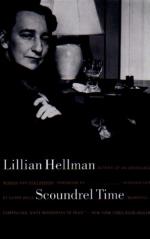|
This section contains 843 words (approx. 3 pages at 400 words per page) |

|
Scoundrel Time Summary & Study Guide Description
Scoundrel Time Summary & Study Guide includes comprehensive information and analysis to help you understand the book. This study guide contains the following sections:
This detailed literature summary also contains Topics for Discussion and a Free Quiz on Scoundrel Time by Lillian Hellman.
"Scoundrel Time" by Lillian Hellman is the true story of the famous playwright's experience with the House Committee on Un-American Activities during the early-1950s. Hellman's name was listed on the infamous blacklist compiled during the latter days of the Truman administration. The majority of those included on the blacklist were people the FBI identified as either Communists or Communist leaning—also known as "fellow travelers." These private citizens were targeted by the government as potential threats to the United States. In other words, these individuals could ultimately be found guilty of treason. In most cases, the people were innocent or in the least non-threatening. Some writers, directors and actors were called into the hearings in the late-forties when the drumbeat against radicals and progressives began.
The government created one of the most egregious eras of civil rights violations ever seen before or since. The majority of the "Hollywood people" called to testified had no idea why they were being scrutinized or what they were expected to say or indeed what they were being accused of. For example, when asked at his hearing if the scripts he read contained propaganda, actor Gary Cooper replied that he did not believe so but that he read them at night. Of course, his response made no sense; but not much was making sense at the time. Those called felt compelled to defend themselves but for the most part they were puzzled as to what they were defending. Actor Charles Laughton received a cable from eastern Europe about the death of an old friend. Panicked, he called the FBI to explain why he was receiving a cable from a Communist country—knowing that FBI had probably intercepted the message.
Even the powerful studio executives lived in fear of the government. Many of these men were originally from foreign countries where government abuse was a given. They were afraid of losing their power and wealth and applied pressure upon their actors, directors and writers to cooperate and be "friendly witnesses." The translation for "friendly witnesses" where those testifying at hearings who would agree to name names.
Dashiell Hammett, Hellman's man friend of many years and a fellow writer, was an avowed member of the Communist Party. Hellman, however, never joined the party. Her "sin" was that she associated with him and others and attended a few party meetings. At these meetings, she usually paid no attention to what the speakers were saying, preferring to people watch instead. Hellman did not even consider herself a radical or progressive. She was basically a non-political artist who admired the passion of the radicals but did not share it. The feds had their eyes on Hammett and he was ultimately called in to testify. Since he refused to cooperate in revealing the names of the financial contributors to a left-leaning organization of which he was a trustee, he was found guilty of un-American activities and given jail time. After he served his time, the IRS attached all his funds. Hammett's career was over. Hammett did not make another dime for the rest of his life.
Lillian Hellman was required to testify at a Committee hearing in May of 1952. Although she naturally felt fearful and did not want to got to jail—she heard about rats in the cells—she had done nothing wrong. She let the Committee know that she would answer any and all questions about herself but would refuse to answer anything about anyone else. Hellman was wise to send a letter stating her position prior to the hearing. The letter was introduced into evidence and her lawyer distributed it to the press. Since the committee could not portray Hellman as uncooperative based on the stance in her letter, the panel realized its tactical error and released her without punishment. She was one of the first to stand up to the committee.
Hellman's reputation and career suffered for years after that. She was broke and even had to take a job at a department store for a while. In 1960 she wrote the play "Toys in the Attic," which was a huge success. The rebounded financially after that and money would not be a problem again. However, the shock and hurt of her experience stayed with her for her entire life. She saw people ruined and lied about. Even when evidence was provided that people were wrongly accused, there was never an apology or acknowledgment of wrong doing. One of the "stars" of the House Committee stars and a hero of the anti-radicals, Richard Nixon, rose to the presidency.
Although Hellman had no respect for the dangerous and unfair men—McCarthy and Nixon and others—she had no real bitterness. She knew her progressive friends had not harmed America but that those unscrupulous men had. Lillian Hellman recovered from her experience—to a degree. Even though she was damaged, she was a firm believer that a person is a blend of all the good and bad encountered in a lifetime.
Read more from the Study Guide
|
This section contains 843 words (approx. 3 pages at 400 words per page) |

|



